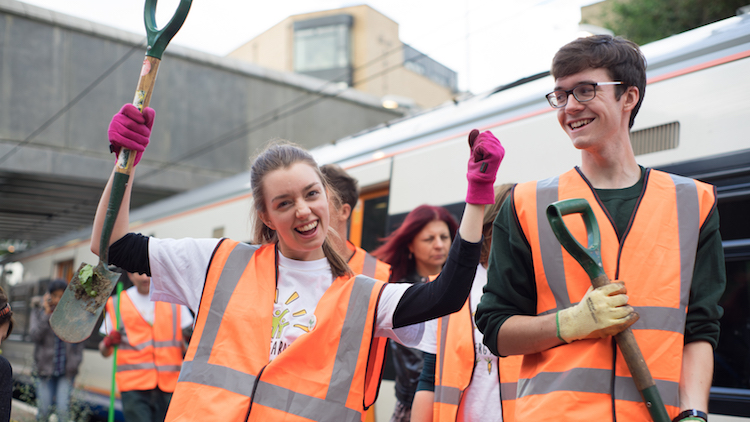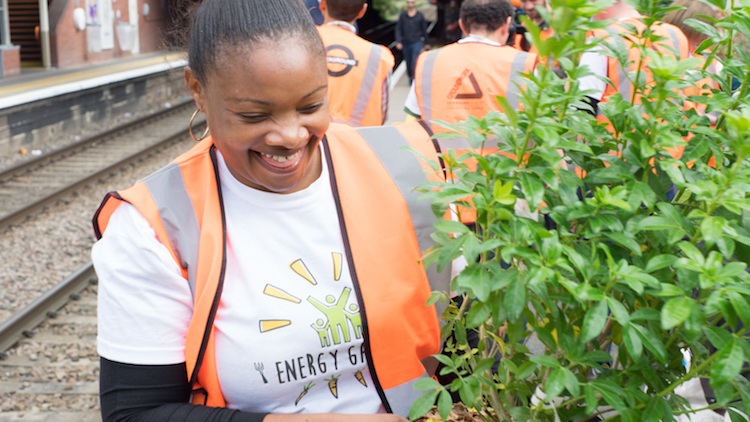
East London residents taking part in RePowering Londons energy gardens project. Pic: RePowering London
The environment has not been topping the agenda in this year’s election campaign but for Hackney resident and renewable energy expert Agamemnon Otero, it should be. “It is life or death,” he said.
With 2016 being possibly the hottest year on record according to the UK Met Office and last year’s State of Nature report warning that 60 per cent of UK species are in decline, perhaps he has a point.
The environment is certainly an issue that chimes with young voters – a 2016 survey by the campaigning group A Focus on Nature found that two thirds of young people said it was a top priority for them.
But what in particular should we be voting for? Who is going to protect our future and our environment? It seems as though the most hotly debated environmental topic ahead of this election is to do with energy – ranging from affordability, cleanliness and long-term damage.

For many young voters the future is green. Pic: Repowering London
In the second part of ELL’s series of pieces ahead of the election, we unpick what each party claims:
Both the Conservatives and Labour have focused on the importance of affordable energy prices. For the Tories, who have made it their ambition to have what they describe in their manifesto as the “lowest energy costs in Europe”, they talk about an diverse energy mix, with our energy being produced through many different sources. This however, means that there is no real focus on renewables, which for many puts them in last place.
For Labour, this is a slightly different story, dedicating an entire page of their manifesto for ‘sustainable energy’ as one of the party’s most pressing issues. Labelling our current energy system as “out-dated, expensive and polluting”, Labour aim to take energy back into public ownership, concentrating on “locally accountable energy companies” and “cooperatives”.
The Liberal Democrats say they aim to “reduce energy bills permanently by improving home insulation and encouraging small-scale, community and local authority renewable schemes”
Their manifesto claims they will make energy saving a “top infrastructure priority”.
For the Green party the answer is clear, “clean green efficient renewable energy” is the future, and this must be embraced immediately.
Their manifesto states that they would introduce a “public works programme of insulation to make every home warm and investing in flood defences and natural flood management to make every community safer”.
On energy, they say they will “replacing fracking, coal power stations, subsidies to fossil fuels and nuclear with the clean green efficient renewable energy of the future, and investing in community owned energy”.
Agamemnon Otero, founding member of Renewable UK, and a non-for-profit organisation that has worked to promote and facilitate the wide scale development and local ownership of renewable energy projects across South London. Speaking to East London Lines about the importance of renewable energy, he didn’t mince his words, saying: “ We’re all going to be made refugees soon”.
Renewable UK have been extremely influential in bringing renewable energy to East London boroughs and working with young locals and in 2014 commissioning Banister House Solar – the first community owned solar energy project in Hackney, generating renewable, community-owned electricity for the Banister House Estate and it’s residents.
For Otero, the choice is clear, urging young people to vote “strategically” for the environment. Speaking to Eastlondonlines he said: ““It is important to vote strategically. We should be investing in our own energy assets, and Labour, Greens and Lib Dems are behind this, the Conservatives are the only people who do not want to see anything happen in terms of renewables.
Politicians work for you, tell them what you want. Renewables and sustainability are important, and you need to tell them that.”
While Otero and other Londoners working with and fighting for renewables are beginning to make a difference in the capital, as a city London falls under the mark when it comes to renewables. In 2016, it was named the worst city in England and Wales when it comes to the use of renewable energy. In statistics found by an analysis by think tank Green Alliance, it was found that just 0.05% of electricity consumption in the capital was met by renewables – a number that needs to be improved by the next government.
Furthermore, two of the main parties have come under fire for their policies on nuclear energy – while the Greens are calling for its abolition.
Labour say they will support nuclear energy while mentioning older plants could be ready for decommissioning (without naming any). They state: “We will support further nuclear projects and protect nuclear workers’ jobs and pensions.”
This claim has come under intense scrutiny due to Jeremy Corbyn and John McDonnell’s earlier opposition to the industry.
They do however affirm their opposition to fracking.
The Liberal Democrats have dropped their 2010 manifesto opposition to new nuclear power stations. The party, they write now, accepts “that new nuclear power stations can play a role in electricity supply provided concerns about safety, disposal of waste and cost are adequately addressed, new technology is incorporated, and there is no public subsidy for new build”.
Like Labour and the Green Party the Liberal Democrats oppose fracking.
The Conservative manifesto makes no mention of nuclear power, but includes fresh support for shale gas – which is extracted by fracking. Historically the party has supported nuclear power.
For international organisations such as Greenpeace, continued support for nuclear projects across the UK “makes no environmental or economic sense”.
Speaking to Eastlondonlines Hannah Martin, Head of Energy at Greenpeace UK, said: “Every nuclear power station currently being built in Europe and the USA has gone massively over time and over budget and the nuclear industry is rife with scandal, safety irregularities and poor management.
“New nuclear builds are a risky gamble, while clean alternatives like offshore wind and solar are ever cheaper and quicker to build.
“It’s time to ditch the old-fashioned obsession with a nuclear sector that consistently overpromises and underperforms, and invest in modern technologies like smart grids, battery storage and interconnection.”




